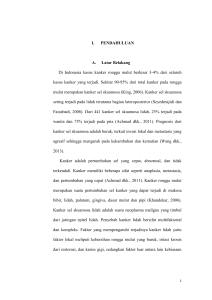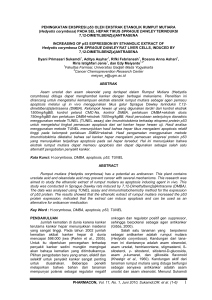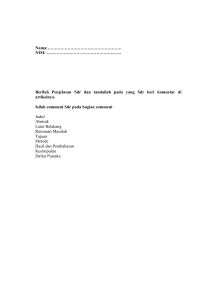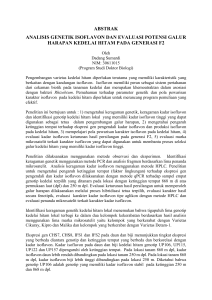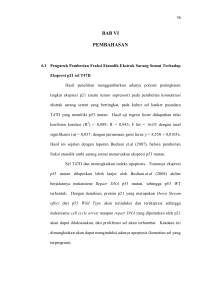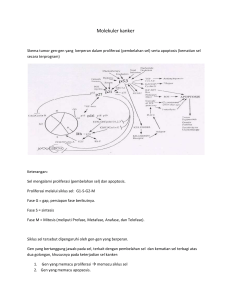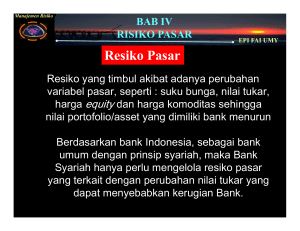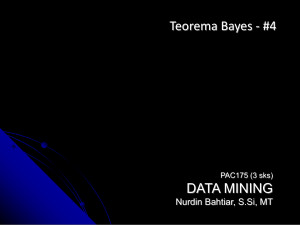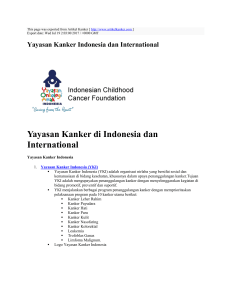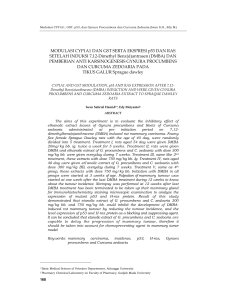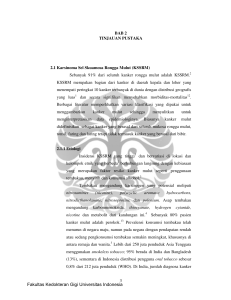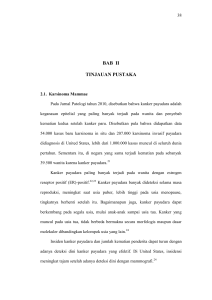intisari pengaruh pemberian senyawa turunan isoflavon
advertisement
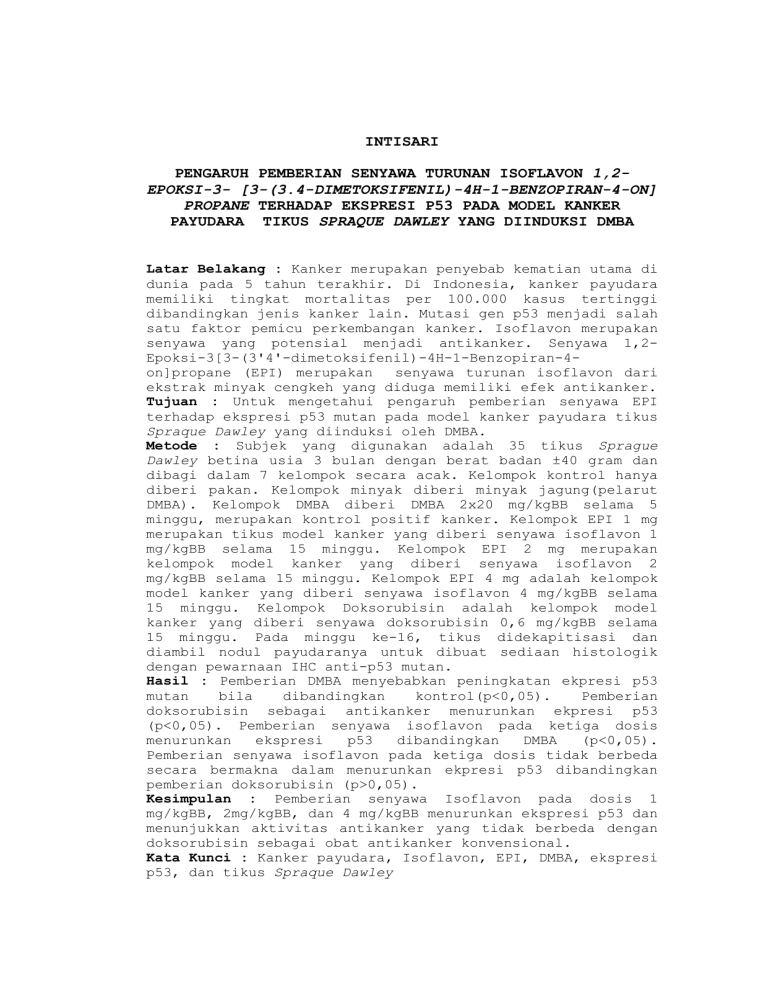
INTISARI PENGARUH PEMBERIAN SENYAWA TURUNAN ISOFLAVON 1,2EPOKSI-3- [3-(3.4-DIMETOKSIFENIL)-4H-1-BENZOPIRAN-4-ON] PROPANE TERHADAP EKSPRESI P53 PADA MODEL KANKER PAYUDARA TIKUS SPRAQUE DAWLEY YANG DIINDUKSI DMBA Latar Belakang : Kanker merupakan penyebab kematian utama di dunia pada 5 tahun terakhir. Di Indonesia, kanker payudara memiliki tingkat mortalitas per 100.000 kasus tertinggi dibandingkan jenis kanker lain. Mutasi gen p53 menjadi salah satu faktor pemicu perkembangan kanker. Isoflavon merupakan senyawa yang potensial menjadi antikanker. Senyawa 1,2Epoksi-3[3-(3'4'-dimetoksifenil)-4H-1-Benzopiran-4on]propane (EPI) merupakan senyawa turunan isoflavon dari ekstrak minyak cengkeh yang diduga memiliki efek antikanker. Tujuan : Untuk mengetahui pengaruh pemberian senyawa EPI terhadap ekspresi p53 mutan pada model kanker payudara tikus Spraque Dawley yang diinduksi oleh DMBA. Metode : Subjek yang digunakan adalah 35 tikus Sprague Dawley betina usia 3 bulan dengan berat badan ±40 gram dan dibagi dalam 7 kelompok secara acak. Kelompok kontrol hanya diberi pakan. Kelompok minyak diberi minyak jagung(pelarut DMBA). Kelompok DMBA diberi DMBA 2x20 mg/kgBB selama 5 minggu, merupakan kontrol positif kanker. Kelompok EPI 1 mg merupakan tikus model kanker yang diberi senyawa isoflavon 1 mg/kgBB selama 15 minggu. Kelompok EPI 2 mg merupakan kelompok model kanker yang diberi senyawa isoflavon 2 mg/kgBB selama 15 minggu. Kelompok EPI 4 mg adalah kelompok model kanker yang diberi senyawa isoflavon 4 mg/kgBB selama 15 minggu. Kelompok Doksorubisin adalah kelompok model kanker yang diberi senyawa doksorubisin 0,6 mg/kgBB selama 15 minggu. Pada minggu ke-16, tikus didekapitisasi dan diambil nodul payudaranya untuk dibuat sediaan histologik dengan pewarnaan IHC anti-p53 mutan. Hasil : Pemberian DMBA menyebabkan peningkatan ekpresi p53 mutan bila dibandingkan kontrol(p<0,05). Pemberian doksorubisin sebagai antikanker menurunkan ekpresi p53 (p<0,05). Pemberian senyawa isoflavon pada ketiga dosis menurunkan ekspresi p53 dibandingkan DMBA (p<0,05). Pemberian senyawa isoflavon pada ketiga dosis tidak berbeda secara bermakna dalam menurunkan ekpresi p53 dibandingkan pemberian doksorubisin (p>0,05). Kesimpulan : Pemberian senyawa Isoflavon pada dosis 1 mg/kgBB, 2mg/kgBB, dan 4 mg/kgBB menurunkan ekspresi p53 dan menunjukkan aktivitas antikanker yang tidak berbeda dengan doksorubisin sebagai obat antikanker konvensional. Kata Kunci : Kanker payudara, Isoflavon, EPI, DMBA, ekspresi p53, dan tikus Spraque Dawley ABSTRACT EFFECT OF ISOFLAVONE DERIVATE 1,2-EPOKSI-3- [3-(3.4DIMETOKSIFENIL)-4H-1-BENZOPIRAN-4-ON] PROPANE ON P53 EXPRESSION FROM BREAST CANCER MODEL OF SPRAQUE DAWLEY RAT INDUCED BY DMBA Background : Cancer is the main cause of worldwide death on the last 5 years. In Indonesia, breast cancer has the highest mortality rate among other cancer types. Mutation on p53 gene being one of cancer development's key factor. Among anticancer substances that to be developed from natural compound, Isoflavone being the most potential candidate. 1,2-Epoksi-3[3-(3'4'-dimetoksifenil)-4H-1-Benzopiran-4on]propane (EPI), one of Isoflavon derivate substance, is assumed to have an anticancer effect. Objectives : To understand the effect of EPI substance on mutant p53 expression from breast cancer model in the aspect of Sprague Dawley rat induced by DMBA. Methods : Subjects used in this research are 35 female Sprague Dawley rat aged ±3 months with weight of ±40 gram and randomly distributed into 7 different groups. Control group was the group that fed only. Oil group was given with corn oil as DMBA solver. DMBA group that was given 2x20 mg/kgBW of DMBA for 5 weeks, was a cancer positive group. EPI 1 mg group was cancer model rat that given isoflavone 1 mg/kgBW for 15 weeks. EPI 2 mg group was a group of cancer model given 2 mg/kgBW of isoflavone for 15 weeks. EPI 4 mg group was a group of cancer model given 4 mg/kgBW of Isoflavone substance for 15 weeks. Doxorubicin group was a group of cancer model given with 0,6 mg/kgBW of Doxorubicin as conventional anticancer drug for 15 weeks. At the end of the 16th week, rats were decapitated and its nodule were removed then were prepared to be histological sample stained by mutant p53 IHC. Results : DMBA caused the increase of p53 expression compared to control group(p<0,05). Doxorubicin as anticancer drug decreased the mutant p53 expression (p<0,05). The isoflavone substances at all doses caused depletion of mutant p53 expression if compared to DMBA group's (p<0,05). The isoflavone substance administration at 3 different doses was not significaly different to decrease the mutant p53 expression compared to doxorubicin group(p>0,05). Conclusion : Administration of Isoflavone substance at 1 mg/kgBW, 2 mg/kgBW, and 4 mg/kgBW dose decreased the p53 expression and shown a non significance different anticancer activities with doxorubicin that known as conventional anticancer drug. Keywords : Breast cancer, Isoflavone, EPI, DMBA, p53 expression, and Spraque Dawley rats.
